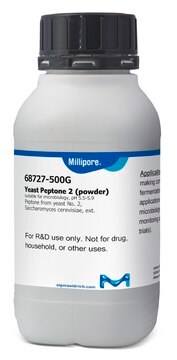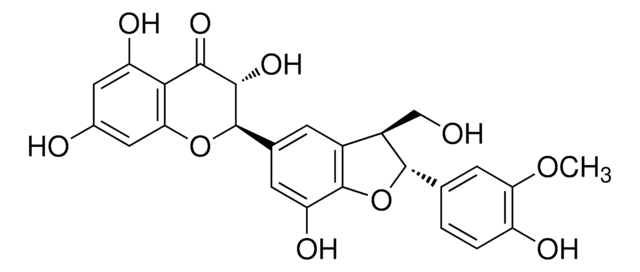78666
Taxifolin
analytical standard
Synonym(s):
(2R,3R)-3,3′,4′,5,7-Pentahydroxyflavanone, (2R,3R)-Dihydroquercetin
About This Item
Recommended Products
grade
analytical standard
Quality Level
Assay
≥85% (HPLC)
technique(s)
HPLC: suitable
gas chromatography (GC): suitable
application(s)
food and beverages
format
neat
SMILES string
O[C@@H]1[C@H](Oc2cc(O)cc(O)c2C1=O)c3ccc(O)c(O)c3
InChI
1S/C15H12O7/c16-7-4-10(19)12-11(5-7)22-15(14(21)13(12)20)6-1-2-8(17)9(18)3-6/h1-5,14-19,21H/t14-,15+/m0/s1
InChI key
CXQWRCVTCMQVQX-LSDHHAIUSA-N
Looking for similar products? Visit Product Comparison Guide
General description
Application
Packaging
Storage Class Code
11 - Combustible Solids
WGK
WGK 3
Flash Point(F)
Not applicable
Flash Point(C)
Not applicable
Personal Protective Equipment
Regulatory Listings
Regulatory Listings are mainly provided for chemical products. Only limited information can be provided here for non-chemical products. No entry means none of the components are listed. It is the user’s obligation to ensure the safe and legal use of the product.
JAN Code
78666-BULK-F:
78666-100MG-F:
78666-25MG-F:
78666-VAR-F:
Choose from one of the most recent versions:
Already Own This Product?
Find documentation for the products that you have recently purchased in the Document Library.
Customers Also Viewed
Articles
Antioxidants protect biological systems from oxidative damage produced by oxygen-containing free radicals and from redoxactive transition metal ions such as iron, copper, and cadmium.
Our team of scientists has experience in all areas of research including Life Science, Material Science, Chemical Synthesis, Chromatography, Analytical and many others.
Contact Technical Service











